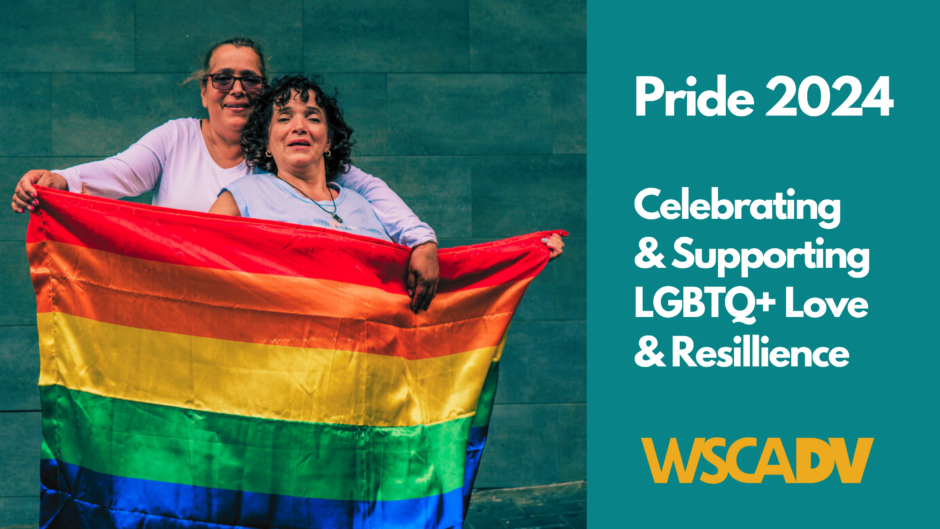
June is the season for celebrating pride, queer love, and being our true selves. Lesbian, Gay, Bisexual, Transgender, and Two-Spirit folks have always been leaders in movements against violence and towards freedom for everyone. LGBTQ+ visibility is at an all-time high in the US, but while pride celebrations fill the streets this month, many communities are also experiencing fear and uncertainty in the wake of rising anti-LGBTQ+ legislation across the country. In 2023 alone, over 520 anti-LGBTQ+ bills were introduced in state legislatures, increasing stigma and eroding legal protections.
LGBTQ+ people experience domestic violence at rates that are similar to or higher than for non-LGBTQ+ folks, but only one in five survivors of same-gender sexual or domestic violence received advocacy services. Trans folks, bisexual women, LGBTQ+ people of color, and queer youth are at especially high risk. Unfair beliefs about LGBTQ+ people and discriminatory legislation not only threatens the safety of queer communities, but also keeps queer survivors from getting the support and resources they need for safety and healing.
When laws strip LGBTQ+ people of their employment or housing protections, survivors who are attempting to leave an abusive relationship or rebuild their lives after violence are left financially vulnerable. When laws attack LGBTQ+ parental rights, survivors who share children with their abusive partner are left without the custody rights they need to protect themselves and their families. When LGBTQ+ youth are denied the information, healthcare, and visibility they need to feel seen and supported, they miss out on tools and resources to develop healthy and safe relationships and are at a higher risk for homelessness, violence, and poor mental health.
Many LGBTQ+ survivors struggle to find services that understand and support their unique needs. They may feel alone and unseen, or have fears about being believed and treated with respect when they ask for help. They might encounter barriers accessing shelters or legal help due to a lack of inclusive policies or resources.
LGBTQ+ folks deserve safety, support, and healthy, respectful relationships. We can’t afford to place more restrictions and barriers on LGBTQ+ survivors’ ability to access healthcare, financial security, and legal protections. Domestic violence is a big issue, but when LGBTQ+ survivors are believed and supported – and when domestic violence programs have the resources and staff they need to provide this support – it can make all the difference. This month – and always – as we honor our queer histories and celebrate pride, let’s continue to work toward a world where all people can live and love freely, without fear.
Want to learn more about supporting LGBTQ+ survivors in your community?
- Webinar: Navigating Intersectional Challenges: Supporting Two-Spirit Survivors Amidst COVID-19 and Housing Insecurity: Wed, Jun 12 2024, 12 – 1:30pm (National Indigenous Womens Resource Center)
- Webinar: Stories Are Our Power: Heart-to-Heart Discussion and Lessons Learned with the U.S. Trans Survey Indigenous Outreach Team: Mon, Jun 24 2024, 1 – 2:30pm (National Indigenous Womens Resource Center)
- Supporting LGBTQ+ Survivors: This online self-study course is intended as a very basic overview of lesbian, gay, bisexual, transgender, and queer/questioning (LGBTQ) issues. It covers LGBTQ history, terminology, rules and regulations, and best practices when working with LGBTQ individuals. (WSCADV)
- LGBTQ2S+ Glossary of Terms (Coalition to Stop Violence Against Native Women)
- Supporting LGBTQ+ Stalking Victims: A Guide for Advocates: This guide is for victim advocates working with lesbian, gay, bisexual, transgender, and queer (LGBTQ+) individuals who may be experiencing stalking. It provides basic information about the dynamics of stalking and safety planning, co-occurring crimes, specific tactics used against LGBTQ+ individuals, safety planning strategies that support LGBTQ+ stalking victims, and issues to be aware of when supporting LGBTQ+ victims. (SPARC and Forge)
- Community Action Toolkit for Addressing IPV Against Transgender People: This toolkit was designed to provide communities with strategies to create dialogue on transgender intimate partner violence, ways to support survivors, and identify resources for intimate partner violence. (The National Coalition of Anti-Violence Programs)
- Toolkit for Increasing Shelter Access to LGBTQ Survivors (The National LGBTQ Institute on Intimate Partner Violence)
- Punished by Design: The Criminalization of Trans & Queer Incarcerated Survivors: This report from Survived & Punished CA highlights the systemic and disproportionate criminal punishment of queer, trans, and gender nonconforming survivors of domestic and/or sexual violence. It focuses on survivors of domestic and/or sexual violence to highlight the pipeline from surviving sexual and domestic violence to criminalization. (Survived & Punished)